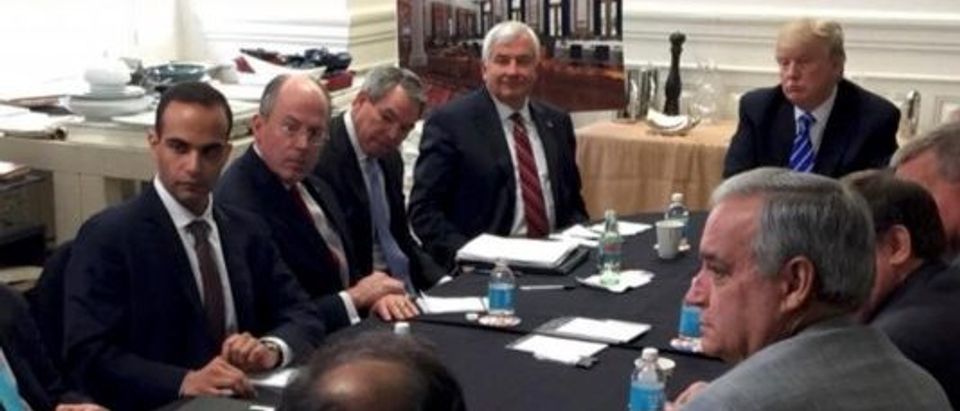President Trump said Friday that he doesn’t “remember much” about a March 2016 meeting in which a volunteer member of his foreign policy advisory team suggested the idea of a meeting with Russian president Vladimir Putin.
“I don’t remember much about that meeting. It was a very unimportant meeting. It took place a long time [ago],” Trump told reporters just as he was about to embark on a trip to Asia.
“All I can tell you is this, there was no collusion, there was no nothing,” he continued.
The meeting in question occurred on March 31, 2016. During the session, George Papadopoulos, a 30-year-old energy consultant, suggested that he could broker a meeting between the campaign and Putin. The meeting, and Trump’s response, is of interest to Special Counsel Robert Mueller, who is conducting an expansive investigation into Russian interference in the election. (RELATED: Trump Adviser Proposed Meeting With Russians, But Sessions Shot Down The Idea)
J.D. Gordon, the director of the Trump campaign’s foreign policy advisory team and a meeting attendee, told The Daily Caller that when Papadopoulos suggested a meeting with Trump, the real estate magnate “heard him out.”
Then-Alabama Sen. Jeff Sessions, who was chairman of the advisory committee and sat opposite Trump, ultimately nixed Papadopoulos’ proposal, sources first told TheDC back in August.
The meeting has become a focal point this week because it was revealed that Papadopoulos pleaded guilty last month to lying to the FBI about contacts he had during the campaign with people with purported ties to the Russian government.
Sessions has come under scrutiny over the meeting because some Democrats have suggested that he lied during two separate Senate hearings about what he knew about campaign contacts with Russians. (RELATED: Mueller Is Interested In Trump’s Response To Aide’s Putin Meeting Offer)
His critics pointed to an exchange he had with South Carolina Sen. Lindsey Graham during an Oct. 18 Senate Judiciary Committee oversight hearing.
“Did you overhear a conversation between you and anybody on the campaign who talked about meeting with the Russians?” Graham asked.
Sessions responded, but by answering a completely different question.
“I have not seen anything that would indicate a collusion with Russians to impact the campaign,” he said.
And during his Jan. 10 confirmation hearing with the same committee, Sessions said that he was “not aware” of anyone in the Trump campaign communicating with the Russian government.
“If there is any evidence that anyone affiliated with the Trump campaign communicated with the Russian government in the course of this campaign, what will you do?” Minnesota Sen. Al Franken asked.
“Sen. Franken, I’m not aware of any of those activities,” Sessions said.
A person familiar with Sessions’ thinking said that Sessions “has no clear recollection” of Papadopoulos at the meeting, though he does recall shooting down a proposal to meet with Putin.
“As far as Sessions seemed to be concerned, when he shut down this idea of Papadopoulos engaging with Russia, that was the end of it and he moved the meeting along to other issues,” the source said.
As for the Jan. 10 testimony, the source asserted that Sessions “has been entirely truthful and consistent on this matter.”
“He had no knowledge of any conversations by anyone connected to the Trump campaign with any Russian or any foreign officials concerning any type of interference with any campaign or election in the United States,” the source said.
Papadopoulos’ motive for seeking meetings between the campaign and Putin are still not clear. But details of his attempts to arrange a conclave of some sort were revealed earlier this week when Mueller’s prosecutors unsealed documents related to Papadopoulos’ case.
Papadopoulos pleaded guilty on Oct. 3 to lying to the FBI during interviews back in January and February.
He was arrested on July 27 and has been cooperating with investigators and prosecutors since then, according to court filings.
Shortly after being informed on March 6, 2016 that he would be joining the campaign, Papadopoulos started communicating with a London-based professor who claimed to have ties to top Russian government officials.
The professor, later identified as Joseph Mifsud, introduced Papadopoulos to a female Russian national as well as to Ivan Timofeev, the head of a think tank backed by the Russian government. Timofeev represented that he was close to the Russian Ministry of Foreign Affairs.
A statement of offense released by Mueller stated that Papadopoulos and the associates discussed arranging meetings between the campaign and Russian government. Papadopoulos also claimed that during an April 26, 2016 meeting in London, Mifsud told him that he had learned from Russian government officials that the Kremlin had obtained “dirt” on Hillary Clinton in the form of “thousands of emails.”
Papadopoulos emailed a person described as a “senior policy adviser” on the campaign to tell them of “messages coming in from Moscow.”
That adviser has not been identified, but a source familiar with Sessions’ activities on the campaign said that “there’s no evidence that Papadopoulos ever emailed then-Senator Sessions.”


